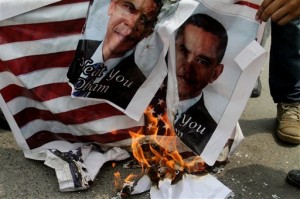
Pakistani lawyers burn pictures of U.S. President Obama at an anti-American rally in Lahore, Pakistan, Tuesday, Sept. 3, 2013. The United States is considering launching a punitive strike against the regime of Syrian President Bashar Assad, blamed by the U.S. and the Syrian opposition for an Aug. 21 alleged chemical weapons attack in a rebel-held suburb of the Syrian capital of Damascus. AP
WASHINGTON — President Barack Obama said Tuesday he is confident Congress will authorize a military strike in Syria, as lawmakers were holding their first public hearing about how to respond to last month’s alleged sarin gas attack outside Damascus.
Obama met with congressional leaders at the White House as part of his push to win over support for his request for authorization for limited military strikes against Syrian President Bashar Assad’s regime. He indicated he is open to changing the language to address lawmakers’ concerns, but urged them to hold a prompt vote.
“So long as we are accomplishing what needs to be accomplished, which is to send a clear message to Assad, to degrade his capabilities to use chemical weapons, not just now but also in the future, as long as the authorization allows us to do that, I’m confident that we’re going to be able to come up with something that hits that mark,” Obama said.
With war-weary Americans skeptical of sparking another long-winded intervention, Obama tried to assure the public involvement in Syria will be a “limited, proportional step.”
“This is not Iraq, and this is not Afghanistan,” Obama said.
After a decade of war in Iraq and Afghanistan, polls show most Americans opposed to any new military action overseas. That reluctance is being reflected by senators and representatives, some of whom say Obama still hasn’t presented bulletproof evidence that Assad’s forces were responsible for the Aug. 21 attack. Others say the president hasn’t explained why intervening is in America’s interest.
The meeting in the Cabinet room included House speaker John Boehner, House Democratic Leader Nancy Pelosi and Senate Minority Leader Mitch McConnell, along with other members of leadership and the heads of the committees on armed services, foreign relations and intelligence. Secretary of State John Kerry, Defense Secretary Chuck Hagel and Joint Chiefs Chairman Gen. Martin Dempsey also attended before heading over to Congress for testimony later in the day before the Senate Foreign Relations Committee. A classified briefing open to all members of Congress was to take place as well.
Obama won conditional support Monday from two of his fiercest foreign policy critics, Republican Sens. John McCain and Lindsey Graham.
A congressional vote against Obama’s request “would be catastrophic in its consequences” for U.S. credibility abroad, McCain told reporters outside the White House following an hour-long private meeting with the president who defeated him in the 2008 election.
But despite Obama’s effort to assuage the two senators’ concerns, neither appeared completely convinced afterward. They said they’d be more inclined to back Obama if the U.S. sought to destroy the Assad government’s launching capabilities and committed to providing more support to rebels seeking to oust Assad from power.
“There will never be a political settlement in Syria as long as Assad is winning,” Graham said.
McCain said Tuesday he is prepared to vote for the authorization that Obama seeks, but he also said he wouldn’t back a resolution that fails to change the battlefield equation, where Assad still has the upper hand.
In an appearance on NBC’ television’s “Today” show, McCain called it “an unfair fight” and said that if the authorization for U.S. military intervention doesn’t change the balance of power, it “will not have the desired effect.”
Sen. Robert Menendez, a Democrat and chairman of the Senate Foreign Relations Committee, said he believes the panel will back Obama if the administration explains “the full case” for the use of force as well as what it sees as the end result. “Not acting has huge consequences,” Menendez said on “CBS This Morning” Tuesday.
“It sends a message” not just to Syria, he said, but to Iran, North Korea and terrorist groups.
After a Labor Day weekend spent listening to concerned constituents, Sen. Chris Coons, D-Delaware, said the administration needed to make its case on these points, if only to counter the misinformation and conspiracy theories circulating about Obama’s plans.
“Several people asked me if we were only interested in getting Syria’s oil,” Coons, a member of the Senate Foreign Relations Committee, said in a telephone interview with The Associated Press. “It’s important that Americans get the facts.”
Petroleum is hardly the most pertinent question. Even before Syria’s hostilities began, its oil industry contributed less than half a percent of the world’s total output. And Obama has expressly ruled out sending American troops into Syria or proposing deeper involvement in the Arab country’s violent civil war.
But such queries are a poignant reminder of the task awaiting the administration as it argues that the United States must exert global leadership in retaliating for what apparently was the deadliest use of chemical weapons anywhere over the past 25 years.
Obama has insisted he was considering a military operation that was limited in duration and scope. The White House said Monday that Obama was open to working with Congress to make changes in the language of the resolution, which Congress was expected to begin considering next week.